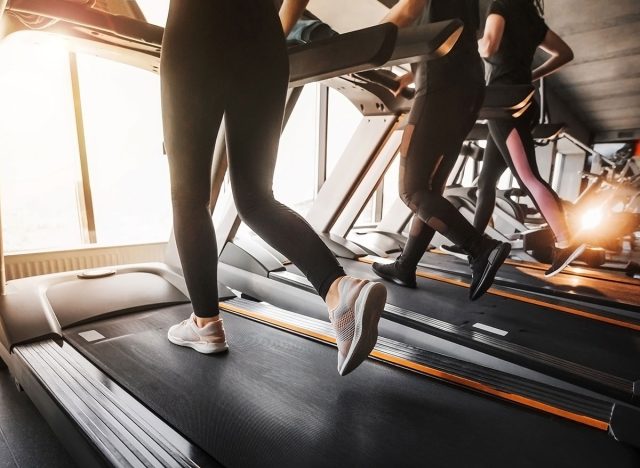Doing This Before Fasting Can Speed Up Your Fat Burn, New Study Says

If you're already looking to get a headstart on your 2022 body and fitness goals, you may be considering a fasting regimen.
Fasting, or going without food for an extended period of time, has been practiced by humans for thousands of years for health, spiritual, or religious reasons. More recently, intermittent fasting has picked up considerable popularity as an effective weight-loss tool, as the diet has proven to be a useful asset in the battle against excess weight.
Now, compelling new research from Brigham Young University published in the scientific journal Medicine & Science in Sports & Exercise has found that there's a way to speed up the entire fat-burning process sparked by the eating plan.
Read on to learn what activity can speed up your fat-burning results from fasting. And for more, don't miss Exercise Tricks for Getting Rid of Belly Fat, Trainer Says.
Exercise first, then fast

Eating patterns and exercise go hand-in-hand, and this study only reinforces that relationship. The study authors report that getting in a vigorous workout just before starting a fast can help your body enter a fat-burning mode much faster… three and a half hours faster to be exact.
Moreover, getting in some exercise before forgoing food also appears to maximize the additional health benefits associated with fasting. Participants who worked out before fasting had significantly higher amounts of chemicals known to help power the body and fight off numerous diseases including cancer and dementia.
"We really wanted to see if we could change the metabolism during the fast through exercise, especially how quickly the body enters ketosis and makes ketones," comments study contributor and BYU Ph.D. student Landon Deru.
Related: This Workout Plan Will Keep You Lean Throughout the Holidays
Ketosis & ketones

When we talk about the human body entering an elevated state of "fat-burning," we're referring to ketosis. Now, on a normal day when we're eating regularly, our bodies run on the simple sugar glucose. During a fast, however, we're not taking in any glucose via food, so eventually, the body turns to other fuel sources. When this occurs and the human body begins burning stored fat for energy, it's referred to as entering a state of ketosis.
When stored fat is burned during ketosis, it produces chemical byproducts known as ketones. Luckily, even these byproducts are considered a health asset. As touched on earlier, scientists and doctors believe these chemicals help energize both the brain and heart and fight ailments like diabetes, Alzheimer's, and Parkinson's.
So, if you're considering a fast to lose some weight, entering ketosis quickly is a great way to see those results you're after in a faster manner. Not to mention, you'll potentially experience the added benefits of ketones.
Related: Sign up for our newsletter for the latest health and fitness news!
The research

A group of 20 healthy adults took part in this project, with each person being asked to participate in two 36-hour fasts. All subjects stayed hydrated during this entire process, of course. After eating one last uniform meal, the study participants were separated into two groups. One immediately began fasting with no exercise, while the others engaged in a strenuous treadmill session for 45-50 minutes first.
After that, each participant completed a series of hunger and mood surveys every two hours and had their levels of B-hydroxybutyrate (BHB), a ketone-like chemical, measured.
The differences between the two cohorts were drastic. Those who exercised entered ketosis three and a half hours faster, on average, and their bodies produced 43% more BHB.
Researchers theorize that exercising before a fast causes the body to burn through a significant amount of energy/glucose, ultimately resulting in a quick transition to ketosis. Those who didn't exercise didn't enter ketosis until about 20-24 hours into their fast.
"For me, the toughest time for fasting is that period between 20 and 24 hours, so if I can do something to stop fasting before 24 hours and get the same health outcomes, that's beneficial," says study co-author Bruce Bailey, a BYU exercise science professor. "Or if I do fast for my usual 24 hours but start with exercise, I'll get even more benefits."
For what it's worth, exercising didn't make participants any more grumpy or irritable than their non-exercising peers. "Everyone's going to be a little grumpier when they fast, but we found that you aren't going to feel worse with the intervention of exercise—with exercise, you can get these extra benefits and be the exact same amount of grumpy as you would be if you didn't exercise," Deru notes.
Related: Secret Effects of Lifting Weights Just Once Per Week, Science Says
Other factors to keep in mind

In summation, the research team made it a point to mention that eating a large, carb-loaded meal before starting a fast may slow down the ketosis process considerably. Additionally, it's important to consult with your doctor before starting a particularly long fast.
"If you carb load or eat a huge meal before you fast, you may not reach ketosis for days, even if you do exercise, so you should eat moderately before fasting," Prof. Bailey explains. "We also don't know the ideal frequency for fasting. There are definitely certain people who shouldn't fast, such as those with Type 1 diabetes, and obviously, it's detrimental to fast 24/7. But for most people, it's perfectly safe and healthy to fast once or even twice a week for 24 or more hours."
This study also did not identify which type of exercise, or length/intensity for that matter is ideal for promoting faster ketosis. That being said, researchers believe the more energy used during a pre-fast workout, the better.
"You can get a pretty good estimation of how many calories you're burning in most exercises, and the more carbohydrates you burn off (without overdoing it or injuring yourself), the better you set the stage for starting ketosis early in your fast," Deru concludes.
For more, check out Doing This One Thing While Strength Training Burns Twice as Many Calories, New Study Says.








